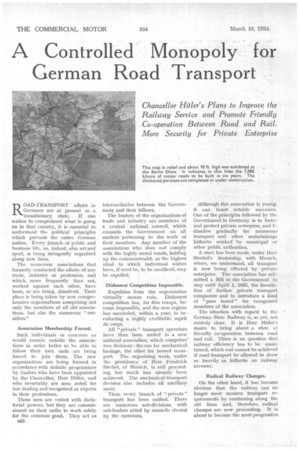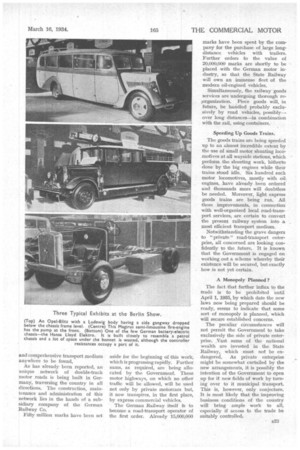A Controlled Monopoly for German Road Transport
Page 32

Page 33

If you've noticed an error in this article please click here to report it so we can fix it.
Chancellor Hitler's Plans to Improve the Railway Service and Promote Friendly Co-operation Between Road and Rail. More Security JO r Private Enterprise
ROAD-TRANSPORT affairs in Germany are at present in a transitionary state. If one wishes to comprehend what is going on in that country, it is essential to understand the political principles which pervade the entire German nation. Every branch of public and business life, as, indeed, also art and sport, is being stringently organized along new lines.
The numerous associations that formerly conducted the affairs Of any trade, industry or profession, and which, more frequently than not, worked against each other, have been, or are being, dissolved. Their place is being taken by new comprehensive organizations comprising not only the members of all old associations, but also the numerous " outsiders."
Association Membership Forced.
Such individuals or concerns as would remain outside the associatdons in order better to be able to follow their Own ends are being forced to join them. The new organizations are being formed in accordance with definite programmes by leaders who have been appointed by the Chancellor, Herr Hitler, and who invariably are men noted for fair dealing and recognized as experts in their professions.
These men are vested with dictatorial powers, but they are commissioned on their oaths to work solely for the common good. They act as a22 intermediaries between the Government and their fellows.
The leaders of the organizations of trade and industry are members of a central national. council, which counsels the Government on all matters pertaining to the work of their members. Any member of the associations who does not comply with the highly moral tenets, holding up the commonwealth as the highest ideal to which individual wishes have, if need be to be sacrificed, may be expelled,
Dishonest Competition Impossible.
Expulsion from the organization virtually means ruin. Dishonest competition has, for this reassmi, become impossible, and the new regime has succeeded, .within a year, in inculcating a highly creditable esprit de corps.
All "private " transport, operators have thus been united in a new national association, which comprises two divisions : the one for mechanical haulage, the other for horsed transport. The organizing work, under the presidency.; of Herr Friedrich Strebel, of Munich, is still proceeding, but much has already been achieved. The mechanical-transport division also includes all ancillary users.
Thus, every branch of " private " transport has been unified. There are numerous sub-divisions, with sub-leaders aided by councils elected by the members.
Although this association is young, it can boast notable successes. One of the principles followed by the Government in Germany is to foster and protect private enterprise, and t-) dissolve gradually the numerous transport and other undertakings hitherto worked by municipal or other public authorities.
A start has been made, -under Herr Strebel's leadership, with Munich, where, we understand, all transport is noW being effected by private enterprise. The association has submitted a Bill to the Government to stop until April I, 1935, the foundation of further private transport companies and to introduce a kind of "pass board" for recognized members of the association.
• The situation with regard' to the German State Railway is, as yet, not entirely clear. It is Herr Hitler's desire to bring about a state of friendly co-operation between road and rail. . There is no question that railway efficiency has to be maintained, which end cannot be achieved if road transport be allowed to draw so heavily as hitherto on railway revenue.
Radical Railway Changes.
On the other hand, it has become obvious that the railway can no longer meet modern transport requirements by continuing along the old lines and, therefore, radical changes are now proceeding. It is about to become the most progressive and comprehensive transport medium anywhere to be found.
As has already been reported, an unique network of double-track motor roads is being built in Germany, traversing the country in all directions. The construction, maintenance and administration of this network lies in the hands of a subsidiary company of the German Railway Co.
Fifty million marks have been set aside for the beginning of this work, which is progressing rapidly. Further sums, as required, are being allocated by the Government. These motor highways, on which no other traffic will be allowed, will be used not only by private motorcars but, it now transpires, in the first place, by express commercial vehicles.
The German Railway itself it to become a road-transport operator of the first order. Already 15,000,000 marks have been spent by the company for the purchase of large longdistance vehicles with trailers. Further orders to the value of 20,000,00.0 marks are shortly to be placed with the German motor industry, so that the State Railway will own an immense fleet of the modern oil-engined vehicles.
Simultaneously, the railway goods services are undergoing thorough re'organization. Piece goods will, in future, be haridled probably exclusively by road vehicles, possibly— over long distances—in combination with the rail, using containers.
Speeding Up Goods Trains.
The goods trains are being speeded up to an almost incredible extent by the use of small motor shunting locomotives at all wayside stations, which perform the shunting work, hitherto done by the big engines while their trains stood idle. Six hundred such motor locomotives, mostly with oil_ engines, have already been ordered and thousands more will doubtless be needed. Moreover, light express goods trains are being run. All these improvements, in connection with well-organized local road-transport services, are certain to convert the present railway system into a most efficient transport medium.
Notwithstanding the grave dangers to " private " road-transport enterprise, all concerned are looking confidently to the future. It is known that the Government is engaged on working out a scheme whereby their existence will be secured, but exactly how is not yet certain.
A Monopoly Planned ?
The fact that further influx to the trade is to be prohibited until April 1, 1935, by which date the new laws now being prepared should be ready, seems to indicate that some sort of monopoly is planned, which will secure established concerns.
The peculiar circumstances will not permit the Government to take exclusively the side of private enterprise. Vast sums of the national wealth are invested in the State Railway, which must not be endangered. As private enterprise might be somewhat curtailed by the new arrangements, it is possibly the intention of the Government to open up for it new fields of work by turning over to it municipal transport. This is, however, only conjecture. It is most likely that the improving business conditions of the country will bring ample work to all, especially if access to the trade be suitably controlled.




















































































